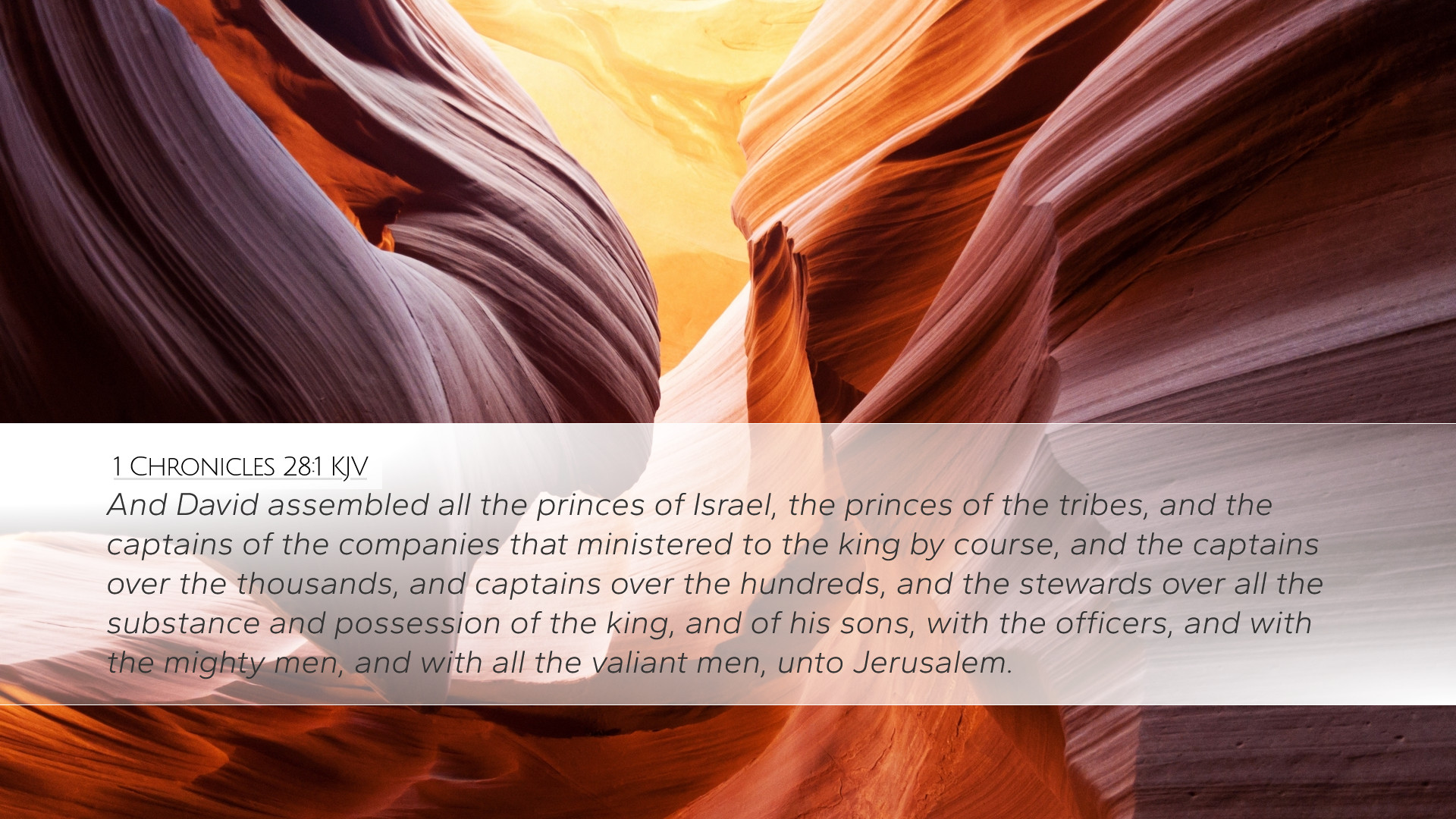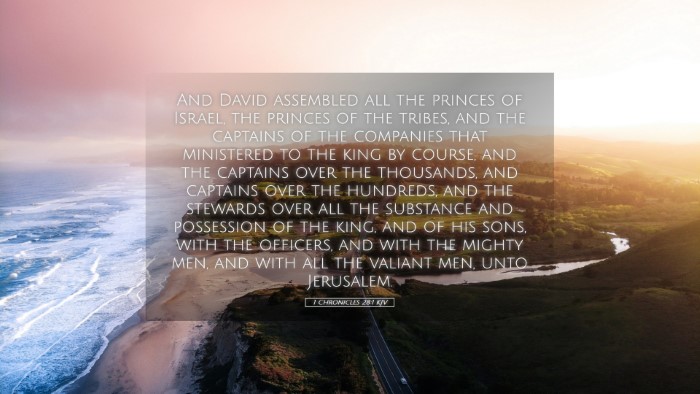Commentary on 1 Chronicles 28:1
Verse Analysis: 1 Chronicles 28:1 states, "And David assembled all the princes of Israel, the princes of the tribes, and the captains of the companies that ministered to the king by course, and the captains over the thousands, and captains over the hundreds, and the stewards over all the substance and possession of the king, and of his sons, with the officials, and with the mighty men, and with all the valiant men, unto Jerusalem."
Contextual Background
The context surrounding 1 Chronicles 28:1 is critical for understanding the significance of King David's assembly. As David approaches the end of his life, he feels the weight of his responsibilities towards the kingdom and the temple of the Lord that he desires to construct. This gathering is not only about political and military matters but also about the spiritual direction of Israel.
Key Themes
- Leadership and Transition: David’s call for leaders signifies a pivotal moment for Israel, transitioning from his reign to that of his son Solomon.
- The Importance of Unity: David brings together various leaders to unify the kingdom in purpose and mission.
- God’s Plans for the Temple: The assembly hints at the preparations for the temple, linking the political and spiritual governance of the nation.
Insights from Public Domain Commentaries
Matthew Henry's Commentary
Matthew Henry notes that David’s gathering was significant because it demonstrated his resolve to ensure that his kingdom would continue in the ways of the Lord. He emphasizes the importance of assembling leaders for collective decision-making and guidance. Henry highlights that David was deliberate in choosing leaders from all facets of society—military, political, and familial—indicating that spiritual matters should involve all sectors of leadership.
In Henry's view, this gathering also set the stage for the commissioning of Solomon as the next king and the detailed instructions regarding the Temple’s construction. David's assembly serves as a model for leaders today, illustrating that spiritual vision must be shared among all leaders to cultivate unity and purpose.
Albert Barnes' Commentary
Albert Barnes provides a detailed breakdown of the various groups mentioned in the verse, capturing the multiplicity of leadership frameworks within Israel. He clarifies that the term 'princes' relates to high-ranking leaders, while 'captains' indicates military leaders, thus stressing the diversity of leaders that David sought to unite.
Barnes further observes that the presence of 'stewards over all the substance' implies a structured approach to governance, essential for any successful kingdom. This organization reflects the necessity of managing resources wisely, especially when preparing for significant undertakings like the building of the Temple. He implies that before any major spiritual undertaking, there must be practical preparations, and the leaders must be in alignment.
Adam Clarke's Commentary
Adam Clarke offers insights into the motivations and implications of this assembly. He suggests that David was not only concerned with the immediate task of appointing a successor but was also influenced by a desire to secure a legacy that affirmed God’s covenant with Israel. Clarke states, “David recognized that his reign was sanctioned by God and desired to ensure that this dedication continued under Solomon.”
Moreover, Clarke highlights that David’s desire to build the Temple was rooted in his love for God and his people. The assembly of leaders serves as an acknowledgment that significant spiritual endeavors require communal commitment and support. Each leader present had a role to play in the impending construction of the temple, symbolizing the collaborative effort needed for fulfilling God’s plans for His dwelling place among His people.
Theological Implications
This verse raises essential questions regarding leadership in the church today. David models a participative leadership style, indicating that divine purposes are best pursued collaboratively. For pastors and church leaders, it serves as a reminder to gather those who share in the mission of building God’s temple, not merely as a physical structure but as the community of believers committed to Christ.
Conclusion
In summary, 1 Chronicles 28:1 encapsulates a moment of transition, unity, and preparation for future generations as David prepares to hand over both the crown and the divine mission of the temple to Solomon. Drawing insights from commentaries by Matthew Henry, Albert Barnes, and Adam Clarke, we see the profound implications of this assembly, illustrating the importance of collaboration among leaders to foster the fulfillment of God’s will on earth. For modern leaders and scholars alike, this passage underscores the necessity of diligence, unity, and spiritual foresight as we lead God’s people in the pursuit of His divine purposes.


